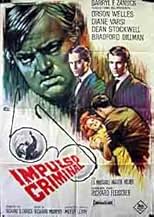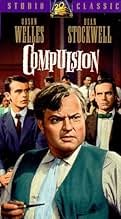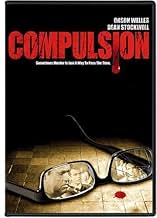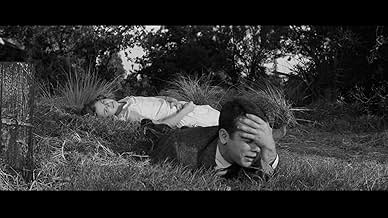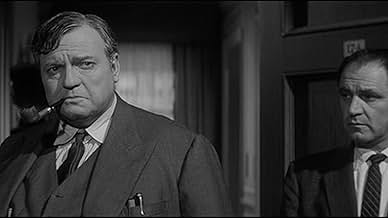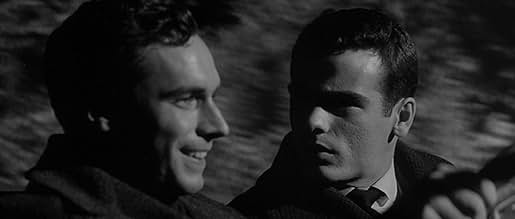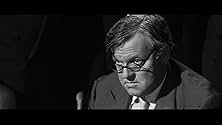IMDb RATING
7.4/10
8.2K
YOUR RATING
Two wealthy law-school students go on trial for murder in this version of the Leopold-Loeb case.Two wealthy law-school students go on trial for murder in this version of the Leopold-Loeb case.Two wealthy law-school students go on trial for murder in this version of the Leopold-Loeb case.
- Nominated for 1 BAFTA Award
- 1 win & 5 nominations total
Robert F. Simon
- Police Lt. Johnson
- (as Robert Simon)
John Alban
- Reporter
- (uncredited)
Don Anderson
- Reporter
- (uncredited)
Brandon Beach
- Courtroom Spectator
- (uncredited)
Terry Becker
- Benson - The Angry Reporter
- (uncredited)
Russ Bender
- Edgar Llewellyn - Attorney
- (uncredited)
- Director
- Writers
- All cast & crew
- Production, box office & more at IMDbPro
Featured reviews
Leopold was paroled after years of being a model prisoner, planning all kinds of prison reforms, and when released did philanthropic work in Puerto Rico. Interesting that Meyer Levin, author of book on which this film is based said, this amazingly redeemed man just a few times gave Levin a chill as it became clear that this character of 'St. Leopold' was just another creation of a true psychopath. The mocking narcissistic smirk was still there under it all.
The film deal with two young men (Bradford Dillman , Dean Stockwell) who murder a pal . They are law students and followers to Nietsche theories . They are investigated by an astute prosecutor (E.G.Marshall) . He's growing suspicion but there isn't one perfect crime . As the relentless justice to be executed and they go on trial for killing . A famous lawyer (Orson Welles) will defend them on the accusation of murderers and under death penalty . A young girl (Diane Varsi) will testify for them .
This highly interesting film is inspired on real events about Nathan Leopold-Richard Lob killing case in Chicago of the 1920s . Although the story was obviously a thinly-disguised recreation of the known murder case , the legal department of 20th Century Fox was still concerned about a possible lawsuit from the still-living Leopold . In fact , a great effort was made not to mention Leopold or Loeb in the film , press releases , and interviews . The film contains suspense , drama , tension , illicit love with intertwining triangles , emotion , courtroom trial and complex intrigue maintained throughout . Besides , superb performances by main roles (Dillman , Stockell , Varsi, Welles) and supporting casting (Martin Milner , Robert F. Simon , Gavin McLeod , among others). Special mention for Orson Welles who displays a terrific acting and explaining a significant speech into criminal court . The movie is visually magnificent with an excellent black and white cinematography by William C. Mellor . Evocative and adjusted music by Lionel Newman . The motion picture was wonderfully directed by Richard Fleischer .
This is the second of four film adaptations of the Leopold-Loeb murder case , other versions about same events are the famous ¨The rope¨ (1948) by Hithcock with John Dall (in the character of Bradford Dillman )and Farley Granger (in the role of Dean Stockwell), ¨Swoon¨ and recently ¨Murder by numbers¨ by Barbet Schroeder with Michael Pitt and Ryan Gosling . Indispensable and fundamental seeing for court genre enthusiasts and Orson Welles fans . It's one of Richard Fleisher's best. Rating : Above average .
This highly interesting film is inspired on real events about Nathan Leopold-Richard Lob killing case in Chicago of the 1920s . Although the story was obviously a thinly-disguised recreation of the known murder case , the legal department of 20th Century Fox was still concerned about a possible lawsuit from the still-living Leopold . In fact , a great effort was made not to mention Leopold or Loeb in the film , press releases , and interviews . The film contains suspense , drama , tension , illicit love with intertwining triangles , emotion , courtroom trial and complex intrigue maintained throughout . Besides , superb performances by main roles (Dillman , Stockell , Varsi, Welles) and supporting casting (Martin Milner , Robert F. Simon , Gavin McLeod , among others). Special mention for Orson Welles who displays a terrific acting and explaining a significant speech into criminal court . The movie is visually magnificent with an excellent black and white cinematography by William C. Mellor . Evocative and adjusted music by Lionel Newman . The motion picture was wonderfully directed by Richard Fleischer .
This is the second of four film adaptations of the Leopold-Loeb murder case , other versions about same events are the famous ¨The rope¨ (1948) by Hithcock with John Dall (in the character of Bradford Dillman )and Farley Granger (in the role of Dean Stockwell), ¨Swoon¨ and recently ¨Murder by numbers¨ by Barbet Schroeder with Michael Pitt and Ryan Gosling . Indispensable and fundamental seeing for court genre enthusiasts and Orson Welles fans . It's one of Richard Fleisher's best. Rating : Above average .
The real-life Leopold-Loeb murder case, which inspired Alfred Hitchcock's "Rope," among other films, is the basis for this story of a couple of rich young men committing a murder just for the thrill of trying to pull off the perfect crime. Stockwell and Dillman are well cast as the cold-blooded killers. The first half of the film, focusing on the strange relationship between the two men, their crime, and their arrest, is quite interesting. Then Welles shows up as the defense attorney and the film loses momentum. Welles seems to be sleep-walking through this one, and his final speech seems to take up about a third of the film.
Watching this 1959 Richard Fleischer confirmed something I've always known. Dean Stockwell is a superb actor and an extraordinary presence on the screen. So, I think it's strange that he's not regarded as one of the greatest actors that ever lived. He started as a kid. He was Gregory Peck's son, twice. He was in musicals with Gene Kelly and Frank Sinatra. He was directed by Elia Kazan. He made allegorical movies like "The Boy With Green Hair" directed by black listed Joseph Losey. He was Edmond in "Long Day's Journey Into Night" sharing the screen with Katharine Hepburn, Ralph Richardson and Jason Robards. No to mention his work in "Sons and Lovers" or the movies with Wim Wenders and David Lynch. Here, in "Compulsion" his performance is worthy of an Oscar and in fact he go the accolades at the Cannes Film Festival sharing the acting honors with Orson Welles and Bradford Dillman. But, looking at it now he is the one that comes out as the one who passed in triumph the test of time. His performance is so rich so perfectly modulated that you go straight into the human center of his sick, appalling character. "Compulsion" deserves to be rediscovered and Dean Stockwell's performance should be the main reason.
If "Compulsion" is still such a powerful film is, totally, Dean Stockwell's merit. What a sensational actor! I'm writing this the day after the announcement of Dennis Hopper's death and while I was looking for a Dennis Hopper movie to watch a came across "Compulsion" Not Hopper but Stockwell and I settled for that anyway. I was riveted by Stockwell's performance because everyone else (with the natural exception of Orson Wells and E G Marshall) seems so dated and acted that Dean's every moment is sheer magic. He doesn't shy away from the awfulness but makes his young monster totally human, provoking in us that element that Orson Welles's closing argument tries to bring to the forefront. If you love great acting, you can't afford to miss Dean Stockwell in "Compulsion"
Did you know
- TriviaBecause Orson Welles was having tax problems during the production, his entire salary for the movie was garnished several hours after principal photography was completed. This upset Welles so much that during the subsequent looping session to re-record improperly recorded dialogue, Welles suddenly stormed from the studio and left the country. All that was left to fix was twenty seconds of unclear dialogue in Welles' climactic courtroom speech, but editor William Reynolds managed to fix this problem without Welles. He took words and pieces of words that Welles had spoken earlier in the movie, and pieced them one by one into those last twenty seconds.
- GoofsWhen the murdered boy is in the morgue, his uncle recognizes him instantly, and the coroner doesn't mention to the young journalist (who found the glasses) that the kid had acid burned all over his face so he couldn't be identified. In the real life case, his face was burned and, most importantly, at the very end of the movie, Orson Welles as the defending attorney mentions that the murdered boy's face was burned with acid.
- Quotes
Jonathan Wilk: If there is any way of destroying hatred and all that goes with it, it's not through evil and hatred and cruelty, but through charity, love, understanding.
- Crazy creditsOpening credits prologue: CHICAGO, 1924
- ConnectionsFeatured in The Paper Chase: Commitments (1983)
Details
- Runtime
- 1h 43m(103 min)
- Color
- Aspect ratio
- 2.35 : 1
Contribute to this page
Suggest an edit or add missing content


